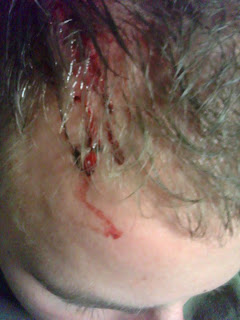The U.S. military is expected to withdraw from Afghanistan by 2014. But thousands of U.S. Marines will still deploy there within the next year to support the war.
To prepare them, the Defense Department has introduced culture training programs at several military bases around the United States. One such program is being conducted at the Quantico Marine Base in Virginia - about 58 kilometers from Washington, D.C.
Marine Corps Captain Josh Parish, a civil affairs officer, will deploy to Afghanistan in 2011. His job will be to work with local tribes to build wells, roads and schools. But he will also work on understanding the sources of insurgency and how the Marines can win the trust of the local population. To get ready for his deployment he is attending a civil affairs class.
"There is a huge push right now towards winning the hearts and minds and the way I see it you know is, if we're able to drive a wedge between the Taliban and the local population than as a civil affairs guy that's when I can come in and using my tools, using my knowledge of their culture, I am able to figure out what are the areas of instability, what are the things that they need," Parish said.
The Marines started their culture learning programs in the aftermath of the Iraq war -- when experience on the ground showed US servicemen did not understand the customs of the country they were fighting in. In 2005, the Marine Corps started a flagship program to teach deploying troops some Arabic, Dari and Pashto, along with the religions, economies and social issues in Iraq and Afghanistan.
"The Marines truly understand that the people are important to winning, they're important to stabilizing, they're important to the security of that region and because of that, because they understand and respect that, they're accepted better," said George Dallas, the director of the program known as the Center for Advanced Operational Culture Learning.
Other branches of the US military have had similar training programs for their special forces or intelligence units. But the Marines' program is the first to give all deploying troops wide access to language and culture training.
Dr. Paula Holmes-Eber, an anthropologist who teaches in the program, says in the beginning, culture was a strange concept for a military used to conventional warfare.
"If you take a Marine who's grown up in Iowa, 19-years-old, never left the US, he will see hese things and not understand them at all. So the hope is that by giving them a framework to think about, there will not be this gut reaction, 'oh, these are strange and awful people' but 'yes, it's different but I can do something about that and I can help them,'" she said. Holmes-Eber says the progress in Iraq's Anbar province provides the best example of how cultural understanding and working with local people turned around the country's most violent province.
To prepare them for future deployments, the Marine Corps now trains its troops about all areas of the world so they are ready for crises, like Haiti, or small conflicts anywhere. "The Marine Corps has a long history of being involved in small wars that range back to early in our history. Since we never really know what the next war is going to be, the next conflict or affected area, making sure that we have this capability of adapting to a population is really critical to our overall success," said Major Jonathan Kenney, an academic planner at the expeditionary warfare school in Quantico, Virginia.
So far, the impact of the Marines' program is hard to measure. But as the 2014 withdrawal deadline gets closer, the Marine Corps believes it will achieve not only the long-term strategy of stability and peace but a better understanding of a culture that until a few years ago was foreign to the troops being sent there.
http://www.voanews.com/english/news/usa/Deploying-US-Marines-Trained-for-Cultural-Sensitivity-112824719.html













